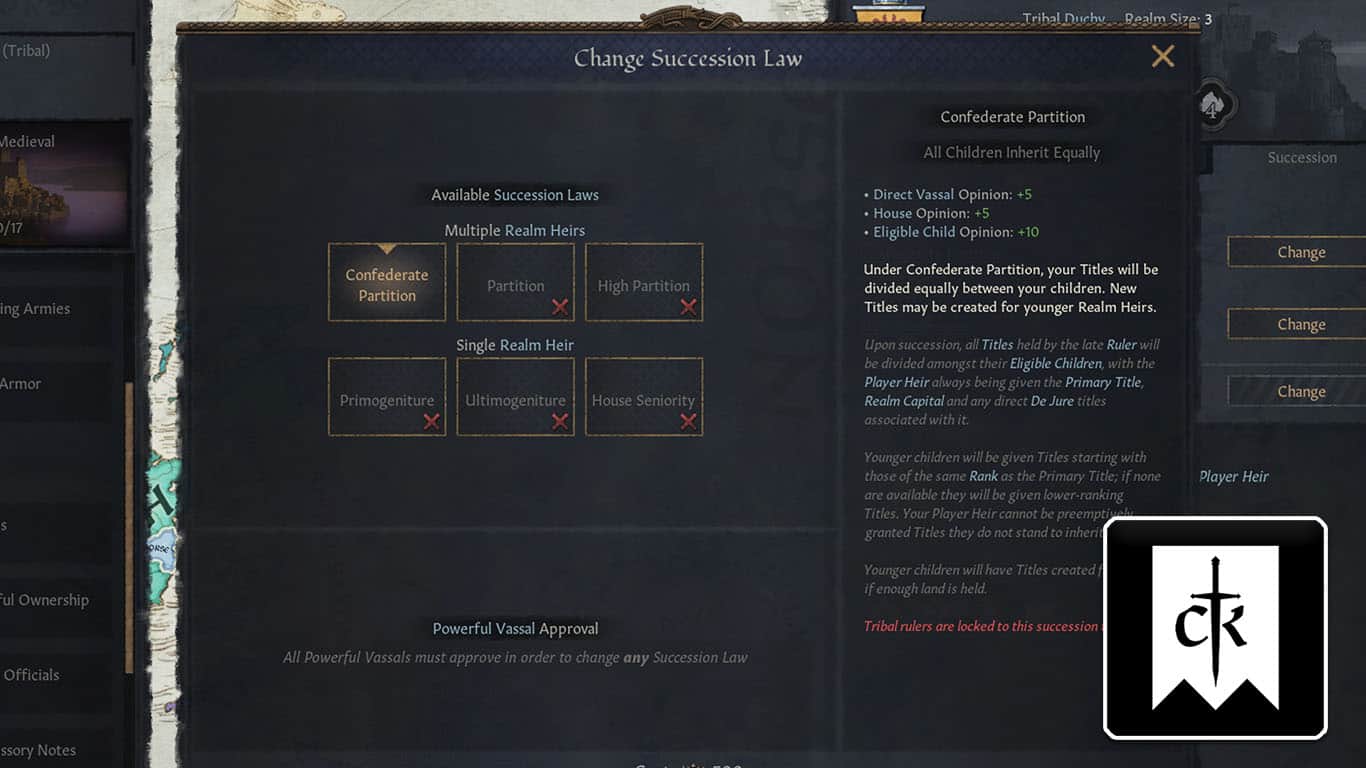A part of Crusader Kings 3 that can be relatively confusing for a starting player is the succession laws.
There are many choices, but you can’t choose any of them. You do know that you lose all your territories for some reason when your character dies though.
Recommended Read: How to Get a Bigger Army in CK3
One of the best ways to keep your kingdom together is to change your succession laws into some of the more favorable ones.
So, here is how succession laws work and how you can use them to keep your titles in Crusader Kings 3.
Table of contents
- How Succession Laws Work in Crusader Kings 3
- All Succession Laws Explained for Crusader Kings 3
- What are the Best Succession Laws to Choose in Crusader Kings 3
- How to Not Lose Titles on Succession in Crusader Kings 3
How Succession Laws Work in Crusader Kings 3
There are two types of Succession Laws in the Realm menu:
- Succession Law
- Gender Law
The Succession Law decides how your territories will be divided when you die and who will gain the majority.
The Gender Law decides which gender will take your titles. Most countries start with Male Preference, which means that women can still inherit titles, but only if there are no males.
Gender Laws are relatively straightforward. You have one where only males can inherit, which can leave you in a bind if you have only girls. There is also one where only females can inherit, but this will leave you with the same problem as the Male Only law.
And then there is the Equal Gender Law, which means that all your heirs have an equal right to the throne, no matter the gender. However, your Faith and Culture must allow Equal rights between men and women to select this law.
If you want to change one of these laws, your most powerful vassals will also have to agree with your choice.
All Succession Laws Explained for Crusader Kings 3
There are exactly six possible choices for the Succession Law in CK3, three of them will part your territories between multiple heirs, and three of them will give all your realm to one person.
Confederate Partition
The normal Succession Law that almost every country will have at the start of a CK3 playthrough is Confederate Partition.
Under Confederate Partition, all your titles will be passed between your children. This means that your main heir will inherit your main titles, and the other ones will be given to your other children.
This succession law is really bad because it can also create new titles when you die. This means that if you conquer a majority of a new de jure kingdom but don’t create the king title, one of your children can create and steal the kingdom once you die.
Your heir will mainly inherit your capital and main title. However, if you have other castles in your capital county, you have a high chance of losing them to an heir.
This is why keeping your kingdom together is extremely hard under Confederate Partition. What is worse is that all Tribal rulers can’t change their Succession Laws. They will be stuck with Confederate Partition until they change their government type.
Partition
The Partition Succession Law becomes available after learning about the Hereditary Rule Early Medieval Innovation.
It generally works the same as Confederate Partition. However, your heirs won’t be able to create new titles.
This means that if your highest title were, for example, king, and you didn’t have two kingdom titles, your realm would stay together when you died.
You will lose some of your titles, but your realm will stay together, and your brothers will just be your vassals.
However, if you have more titles of the same rank as your primary title, then your realm will be separated when you die.
High Partition
High Partition will become available after researching the Heraldry High Medieval Innovation (at least 1050 AD).
This law works exactly the same Partition, but your main heir will get at least half of your titles. Even if you have 10 children, your main heir will get the biggest part.
However, you will still lose titles that are the same rank as your primary title.
House Seniority
House Seniority is the first Succession Law that will allow you to keep all of your titles when you die.
However, your heir will be the oldest person in your dynasty, not one of your children.
So, for example, your brother or uncle can take over the country when you die, but you won’t lose any titles.
Though this is the first Single Heir Succession Law that will become available, it can also bring some problems.
Your children and vassals will be upset with this Succession Law. Also, your heir will always be relatively old, which means that they will always have a short reign.
A short reign will usually have disadvantages, such as lowered relations with your vassals.
Primogeniture
Primogeniture will become available in the Late Medieval Era (1200 AD), and it is the best of both worlds.
Under Primogeniture, the oldest child will inherit all of your titles. There won’t be any more partitions, and your other children won’t get anything.
However, you will have to give titles to your other children manually. Otherwise, you will get a huge Prestige debuff, and your children will hate you.
One problem you might have with this Succession Law is that you won’t be able to choose a better heir from your children.
Luckily, if you have Absolute Crown Authority, you can designate your heir. This means that you can choose which one of your children will inherit everything under Primogeniture.
Ultimogeniture
Ultimogeniture will become available along with Primogeniture, and it will give all of your titles to your youngest heir.
This can be useful if you want a younger heir on the throne to get the long reign buff.
However, having a young child on the throne can result in a quick end with an assassination.
Otherwise, Ultimogeniture works exactly the same as Primogeniture.
What are the Best Succession Laws to Choose in Crusader Kings 3
By far, the best Succession Laws in CK3 to choose from are Primogeniture and Ultimogeniture.
These two laws will make sure that you don’t lose anything and that you will know for sure who gets all of your territories.
House Seniority is also a decent choice. However, it will usually bring some problems with your children and vassals.
How to Not Lose Titles on Succession in Crusader Kings 3
In theory, the best way to not lose any titles on succession in CK3 would be to have a Single Heir Succession Law, such as Primogeniture, Ultimogeniture, and House Seniority.
However, these become available relatively late in the game, so you will usually have to find a way to keep your titles with one of the Partition laws.
The best way to make sure that you keep your territories after death is to not hold two primary titles of the same rank.
This means that if you are a duke, you shouldn’t hold more than one dukedom title. If you do, make sure you quickly get the kingdom title.
The same stands for kings and then emperors. However, if you’ve reached the point where you have become an emperor, you should have access to more Succession Laws.
As long as you don’t have the Confederate Partition law, you should be safe. If you do have Confederate Partition, it will be amazingly hard to keep your titles after succession.
That’s everything you need to know about how succession laws work in Crusader Kings 3!
Have any input or suggestions for this guide? Let us know in the comment section below.




